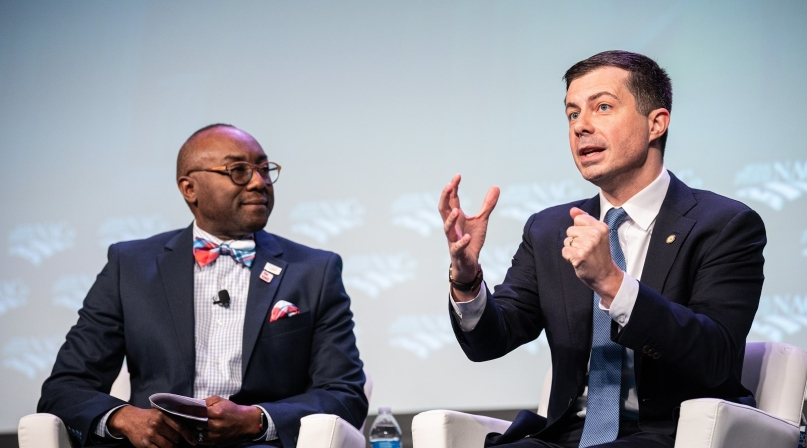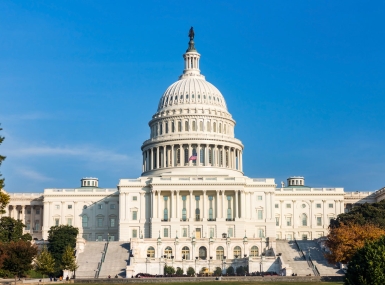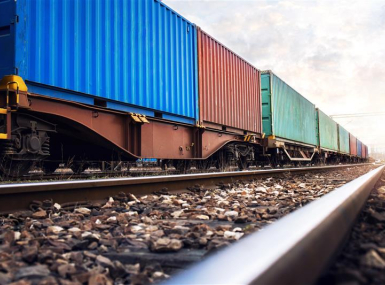Buttigieg talks partnering with counties on infrastructure, safety, climate change

Key Takeaways
Counties and the federal government must work together to get the most out of funding for the Safe Streets and Roads for All program and the Bipartisan Infrastructure Law, Transportation Sec. Pete Buttigieg told a General Session audience Monday at the NACo Legislative Conference.
“When I was mayor, I believed that local government was the key for getting things done, and the reality is the answers, the projects, the delivery doesn’t come from Washington, but more of the funding should, and that’s exactly what we’re doing with the Bipartisan Infrastructure Law — we’re seeking to work with our partners on the ground to help you meet the priorities that you’ve known all along need to get done,” Buttigieg said.
Buttigieg pointed to benefits the Rural Surface Transportation Grant program has brought counties, including the addition of a ferry boat to provide access across the Mississippi River in Plaquemines Parish, La. and a railroad project in Clay County, Minn.
“We have more funding than ever, and we know that it’s not just having the funding out there, it’s making it easier to work with,” Buttigieg said. “Rural counties don’t have legions of federal relations staff to pick through federal requirements to work with our agents, we get that, and so we are available on request –– we can often provide technical assistance to help work that process, not just securing a grant but getting those dollars out and we want to help you deliver.”
To combat rising numbers in pedestrian deaths and injuries related to transportation, Buttigieg said that counties need to focus on road design, reducing speed and reducing the number of “conflict points.” The success of Vision Zero, a strategy to eliminate traffic deaths and severe injuries, shows that sometimes the best way to prove that something can be done is to implement it at the local level, Buttigieg said.
“Some people struggle with that, because it sounds so pie in the sky, but it’s actually happened,” he said. “It hasn’t happened nationwide, but it’s happened in Jersey City, it’s happened in Hoboken, in Evanston, Ill., so instead of saying, ‘How do we get from 40,000 to zero overnight?’ we say, ‘How do we take the roster of the places that got there and make that roster longer each passing year? It just changes the conversation and I think sometimes expands our imagination about what’s possible.”
Over 7,000 miles of highway, 3,700 bridges and 8,000 buses, ferries and other transit are being created through funding from the Bipartisan Infrastructure Law, Buttigieg said.
“We can’t tell you what your community’s priorities are, but we can partner with you on priorities that I think we all share –– safety, job creation … climate change,” Buttigieg said. “This is not going to be easy –– none of this is easy. You’ve got to deal with escalating costs and the inflationary environment that we have, you’ve got to deal with permitting, you’ve got to deal with local alignment, with raw materials, workforce constraints.
“But I would argue that these are the kinds of problems we went into public service to solve.”
Attachments
Related News

Federal district court issues ruling preventing the federal government from imposing immigration compliance mandates on grant recipients
On November 4, a federal judge in Rhode Island ruled that the U.S. Department of Transportation cannot condition federal grant funding on a recipient’s cooperation with federal immigration enforcement efforts.

U.S. House of Representatives passes SPEED Act and other permitting reform bills
On December 18, the U.S. House of Representatives passed the SPEED Act (H.R. 4776). The SPEED Act would strengthen county involvement in decision-making and make needed commonsense reforms to the federal environmental review process.

Counties and Railroads: Shared Priorities for the Next Surface Transportation Bill
County leaders from across the country have a vital opportunity to ensure their infrastructure priorities are front and center.
